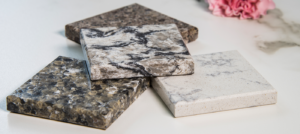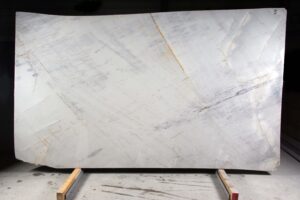All About Natural Stone Countertops: 4 Frequently Asked Questions
Natural stone countertops are stunning—from granite to marble to soapstone, you can’t go wrong. But how do you actually decide on the natural stone that works for you? Find out by exploring the answers to these four frequently asked questions about the most popular natural stones (plus some fun facts).
Natural stone countertops such as granite, marble, soapstone and quartzite offer uniqueness and character like no other material. Slabs are cut from a larger stone, giving each piece its own veining and coloring. Its true beauty is best appreciated in person.
In this guide, we’ll take a deep dive into everything you need to know about natural stone countertops.
Table of Contents
- What are natural stone countertops?
- What are the different types of natural stone?
- How do you care for natural stone counters?
- How much does natural stone cost?
- Fun Facts
#1. What are natural stone countertops?
Natural stone countertops are what they sound like. Natural stone.
Unlike composite materials like quartz products and solid surfaces, natural stone countertops aren’t manmade. Their unique colors and patterns are the result of the unique geological conditions each stone endured over millions of years.
#2. What are the different types of natural stone?
Granite

Granite is an igneous rock consisting of quartz, mica and feldspar. Hundreds of colors are found naturally, which make it a versatile design element for kitchens and bathrooms. It’s durable and not easily chipped or damaged by heat. Granite adds to the overall value of the home because it’s easy to maintain and has a distinctive and desirable look.
Marble

Marble is a hard, crystalline metamorphic form of limestone that appears naturally in a range of colors and features elegant veining. Since it can take a polish, marble makes a popular choice for many homes. However, it’s a much softer material than granite. For that reason, marble requires more care and attention to maintain its original appearance and can acquire a worn patina over time in heavy use areas.
Soapstone
Soapstone is a soft metamorphic rock mostly made of talc. It appears naturally in a modest range of hues and is an appealing choice for many applications due to its durability, stain and heat resistance. It’s also unaffected by acids.
Quartzite
Quartzite is a hard, metamorphic rock that originates as sandstone. Through high heat and pressure over a long period of time, sandstone transforms into the much stronger quartzite. It’s stylish with a soft look similar to marble, yet harder, more like granite, so its popularity is increasing rapidly. It gets its veining from individual pieces of quartz getting mixed into that high heat and pressure process.
#3. How do you care for natural stone countertops?
Natural stone countertops look fabulous, and they’re very durable. But they do still require some care if you want them to stay looking brand new. These care tips will keep your countertops in pristine condition.
Always be sure to clean up spills as soon as they occur. And even though these countertops are durable, it’s still recommended across all natural materials to use a cutting board to avoid scratches and trivets to avoid any heat distortion. Below are upkeep tips unique to each type of natural stone.
Granite Countertop Maintenance
- Granite countertops require regular resealing to guard against staining. It’s recommended to reseal lighter color stones at least once a year, and darker stones every two to three years due to their greater density.
- Everyday maintenance can be as simple as a mild cleaner, such as dish detergent, and water. Dry well with a clean, soft cloth to avoid watermarks or streaking.
- Agents containing ammonia should be avoided, as they tend to break down the sealer over time.
- Granite cleaners aren’t required but may also be used periodically.
Marble Countertop Maintenance
- Marble countertops require more frequent sealing than granite due to being more porous.
- It’s best to use only a mild cleaner with a neutral pH. Avoid harsh agents and abrasives for daily cleaning. They may leave marks and discolorations in marble countertops.
- Clean spills as soon as they happen – especially wine, juice and vinegar spills. Acids can permanently damage marble.
Soapstone Countertop Maintenance
- Soapstone only requires gentle cleaners for daily care. Ideally, mild soap and water is all you need to clean soapstone.
- You can choose to apply mineral oil to help speed up and even out the natural darkening that soapstone undergoes. Use a cloth rag to buff the oil into the surface. If spots lighten up, just reapply usually 1-3 months apart. After 8-12 months the darker color should be permanent.
- Be sure to avoid harsh agents as this will reverse the mineral oil buff.
- This process can also be done with a mixture of linseed oil and beeswax, and it can usually be done in just one application.
Quartzite Countertop Maintenance
- Caring for quartzite is similar to caring for granite. Clean regularly with a gentle cleaner, water and a soft cloth.
- Preventative measure like wiping up spills as quickly as possible will help extend the life of your quartzite countertops.
- Use coaster, trivets and cooling racks.
- Periodic sealing is recommended. Consult with your fabricator for frequency.
#4. How much does natural stone cost?

It’s widely believed that pricing levels of natural stone countertops you may see in a showroom are dependent on stone “grades” or quality levels. But this is just a myth. It is true that there are various grades of stone, but most reputable, established suppliers will only carry grade “A” stones.
The pricing comparison for most natural stone slabs within the same material depends largely on availability, veining and color. For instance, colors that are rarer will typically be more costly than colors that are abundant and readily available.
Prices are, however, still dependent on many different factors, and even these pricing trends could change. It’s best to consult with a professional supplier to go over your budget and pricing options to see what will work best for you.
Fun Facts about Natural Stone Countertop Materials
Granite Facts
- Granite is one of the hardest materials in the world. It ranks between 6 and 7 on the Mohs scale (used to measure hardness). For reference, a diamond ranks in at a 10, which is the highest you can go on the Mohs scale.
- Granite has been used as a building material since the time of the Egyptians. It’s been used to build some of the most famous monuments and memorials in the world.
- Best of all, no two slabs or granite are the same! Color, specks and veining patterns are all unique slab to slab. You truly get a one-of-a-kind when you go for a granite countertop.
Marble Facts
- Marble comes from the mountains. It’s found in the oldest parts of the earth’s crust and mined across the world. Most famously, marble is mined in the mountains of Carrara, Italy.
- Acids stain marble because of a chemical reaction that happens when the acid interacts with the stone’s calcium carbonate makeup. But the great thing is that the right products paired with professional help can help restore its original beauty if needed.
- Marble is a favorite of artists, sculptors and builders alike. It’s the primary building material in historic structures like the Taj Mahal, the Pantheon, the Lincoln Memorial and the Leaning Tower of Pisa. Add historic luxury to your home!
Soapstone Facts
- Soapstone got its name from the soft, silky or even “soapy” feel it has thanks to the high amount of talc in the stone.
- Due to its high heat resistance, humans in the Stone Age used soapstone as heating rocks and cooking slabs. As humans progressed to the Bronze Age, they used that same heat-resistance to make metal casting molds for tools and weapons.
- Today, soapstone isn’t just used for countertops. It’s commonly used as an insulator in electrical components due to its low conductivity.
Quartzite Facts

- Quartzite is very hard. It rates a 7/10 on the Mohs scale, so be wary of anything labeled “soft quartzite.” It’s probably fake. Quartzite isn’t soft.
- Quartz products and quartzite are not the same, even though many mistake them to be. Quartz is a manufactured product, while quartzite is a naturally mined slab.
- Quartzite is also used as a source of silica, which is used to create silicon compounds for electronics.
Conclusion
Natural stone is and always will be a great option for any countertop. These gorgeous stones will add character and a look that’s all your own to your next kitchen or bathroom renovation.
Ready to choose the right natural stone countertop for you? Request a countertop quote through Eastern Surfaces, your Lehigh Valley granite countertop supplier, today!






